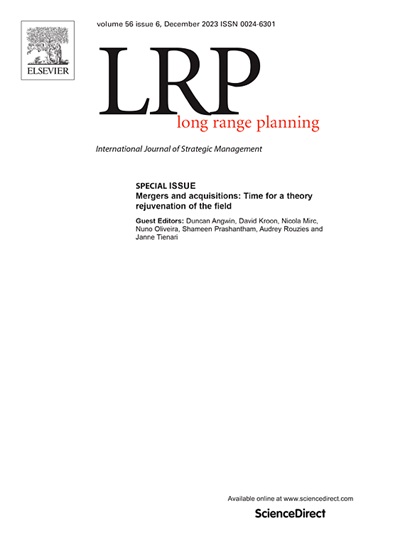情感开放:高层管理者如何在包容性战略制定过程中利用外围参与者的情感表达
IF 6.3
2区 管理学
Q1 BUSINESS
引用次数: 0
摘要
在本文中,我们通过一个实时案例,建立了关于高层管理者如何捕捉和利用边缘行动者(通常不参与战略的行动者)的情绪表达来帮助他们制定战略的理论。我们展示了外围参与者的情绪波动如何迫使高层管理者重新评估战略并进行 "情绪处理"。通过三个相互关联的过程--收集、利用和整合--高层管理者能够从外围参与者那里收集情绪表达,并以这样一种方式理解它们,即在高层管理者制定包容性战略时,它们能够为高层管理者提供有关其战略决策和方向是否合适的信息。高层管理者会考虑外围行动者提出的问题的 "情感量",即这些问题的表达频率和情感表达程度,从而确定哪些问题需要关注和采取行动。当外围参与者表达积极情绪时,就表示对战略的认可和支持,而表达消极情绪则表示存在问题,需要高层管理者调整战略内容。这项研究对有关战略制定和情感的文献具有重要意义,它阐明了组织高层以外的情感表达如何在战略制定过程中被用作一种信息资源。本文章由计算机程序翻译,如有差异,请以英文原文为准。
Opening up emotionally: How top managers use peripheral actors' emotional expressions during inclusive strategy formulation
In this paper, we build theory concerning how top managers can capture and use the emotional expressions of peripheral actors—actors who are not typically involved in strategy—to help them formulate strategy, using a real-time case. We show how the existence of emotional tumult amongst peripheral actors can force top managers to reassess strategy and engage in ‘emotion processing.’ Through three inter-related processes—canvassing, harnessing, and integrating—top managers are able to solicit emotional expressions from peripheral actors and understand them in such a way that they provide top managers with information regarding the appropriateness of their strategic decisions and directions, as they formulate strategy inclusively. Top managers consider the ‘emotional volume’ of issues that are raised by peripheral actors, in terms of how frequently and emotionally they are expressed, allowing them to determine which issues demand attention and action. When peripheral actors express positive emotions, it signals approval of and support for strategy, whereas expressions of negative emotion can indicate the existence of problems and a need for top managers to adjust the contents of strategy. This study has important implications for the literature on strategy formulation and emotion, elucidating how emotional expressions of those outside the organizational upper echelons can be used as an informational resource during strategy formulation.
求助全文
通过发布文献求助,成功后即可免费获取论文全文。
去求助
来源期刊

Long Range Planning
Multiple-
CiteScore
13.00
自引率
7.10%
发文量
75
期刊介绍:
Long Range Planning (LRP) is an internationally renowned journal specializing in the field of strategic management. Since its establishment in 1968, the journal has consistently published original research, garnering a strong reputation among academics. LRP actively encourages the submission of articles that involve empirical research and theoretical perspectives, including studies that provide critical assessments and analysis of the current state of knowledge in crucial strategic areas. The primary user base of LRP primarily comprises individuals from academic backgrounds, with the journal playing a dual role within this community. Firstly, it serves as a platform for the dissemination of research findings among academic researchers. Secondly, it serves as a channel for the transmission of ideas that can be effectively utilized in educational settings. The articles published in LRP cater to a diverse audience, including practicing managers and students in professional programs. While some articles may focus on practical applications, others may primarily target academic researchers. LRP adopts an inclusive approach to empirical research, accepting studies that draw on various methodologies such as primary survey data, archival data, case studies, and recognized approaches to data collection.
 求助内容:
求助内容: 应助结果提醒方式:
应助结果提醒方式:


